Quartermaster
 Each infantry battalion included a commissioned
Regimental Quartermaster and initially cavalry units had one for
each troop, but while both appear to have enjoyed comparable rates
of pay, their status was actually quite different.
Each infantry battalion included a commissioned
Regimental Quartermaster and initially cavalry units had one for
each troop, but while both appear to have enjoyed comparable rates
of pay, their status was actually quite different.
In the infantry it was essentially an appointment, which could in theory be held by any officer. Although Quartermaster's commissions were originally purchasable like any other, this practice was forbidden by George III in 1779: "the proper persons to be recommended for quartermasters are active Sergeants, His Majesty not thinking the office very fit for men of better extraction and consequently very improper for a Captain...."
Nevertheless, there was nothing to prevent a Quartermaster thus risen from the ranks from subsequently holding an Ensign's commission by purchase. A good example was Alexander Davidson who was commissioned Quartermaster of 1/Royals on 28th May 1782. Ten years later, while the battalion was on Jamaica, he obtained an Ensign's commission and would have been promoted to Lieutenant in October 1794 had he not had the misfortune to die before the happy news reached San Domingo.
Cavalry Quartermasters on the other hand were originally junior officers, ranking below the Cornets, but by the mid 18th century they had become the equivalent of the modern Troop Sergeant or Troop Sergeant Major and the rank was abolished entirely in 1809 and replaced by a single (commissioned) regimental Quartermaster.
Paymaster
The Paymaster, oddly enough was a comparatively recent appointment. Prior to 1797 the job was held on a part-time basis by one of the company officers almost invariably one of the Captains. He did not hold rank as such, for the appointment did not appear in the Army List, but rather assumed the job in addition to his ordinary military duties after providing suitable financial securities. Although the Colonel was clearly in a position to make strong recommendations, in this matter at least he was sometimes rather in a position of first amongst equals, for the appointment was traditionally decided by means of a vote amongst all the Captains - of whom the Colonel was but one.
On the 18th November 1797, however, a circular letter from the War Office advised that all existing appointments would cease as of the 24th December. Those nominated to fill the position after that date were to be properly commissioned as such, but while they were to rank with the Captains, it was strictly laid down that they were not to undertake ordinary regimental duties, assume military command - or expect promotion.
Adjutant
The Adjutant's was a particularly responsible post since he was expected to act as assistant to the Major, look after the drill of recruits (including newly commissioned Ensigns) and in general terms take day to day responsibility for administration. Like the Chaplaincy it was originally open to purchase from the Colonel himself, but this practice was actively discouraged and eventually suppressed. While there are instances of men - often former NCOs - holding Adjutant's rank alone in the 18th century, prior to 1802 it was an appointment usually given to keen young Lieutenants, or much less commonly to Ensigns.
Like the Field officers they were expected to combine their regimental and company duties but on the 10th of June 1802 a War Office circular laid down that they were no longer to receive their subaltern's pay and were to be borne on the regiment's books as supernumeraries in whatever rank they presently held. They were of course compensated by an increase in the pay due to them as Adjutants and unlike Paymasters were to retain their present regimental seniorities for the purposes of any future promotions. Those Adjutants not already holding Subalterns' commissions were to rank as Ensigns or Cornets as of the 25th May 1802 and while they would not of course draw pay for that rank, they would rise in seniority accordingly.
Agent
Finally, there was the Regimental Agent or Army Agent. This gentleman was not an officer at all but a civilian, although a number had served in the army at one time or another. Nevertheless he was a most important figure. As late as the middle of the 18th century he was little more than the Colonel's confidential clerk, but as the century progressed his status and responsibilities grew and sole practitioners gave way to large Agencies handling the affairs of several regiments. In 1798 the Deputy Secretary at War succinctly described the Agent's functions as being to:
- "...apply for, receive, disburse and account for
public money advanced to him under general regulations or by
particular orders. He is the ordinary channel of communication
between the Regiment and the Public Departments and is resorted to
not only for providing and forwarding of arms, clothing and other
regimental supplies, but also in the business, public or private, of
the individual officers."
As far as this present study is concerned, the last function was the most important, for the Agent served as a banker and business manager for the individual officers serving in 'their' regiments, arranging exchanges and promotions - and often advancing the money to purchase those promotions.
More Officers and Gentlemen Part I
-
Part I: Introduction
Part I: Regimental Officer Structure
Part I: Surgeon, Chaplain
Part I: Quartermaster, Paymaster, Adjutant, Agent
Part I: Staff Officers
Officers and Gentlemen Part II
Back to Age of Napoleon 30 Table of Contents
Back to Age of Napoleon List of Issues
Back to MagWeb Master List of Magazines
© Copyright 1999 by Partizan Press.
This article appears in MagWeb (Magazine Web) on the Internet World Wide Web.
Other military history articles and gaming articles are available at http://www.magweb.com